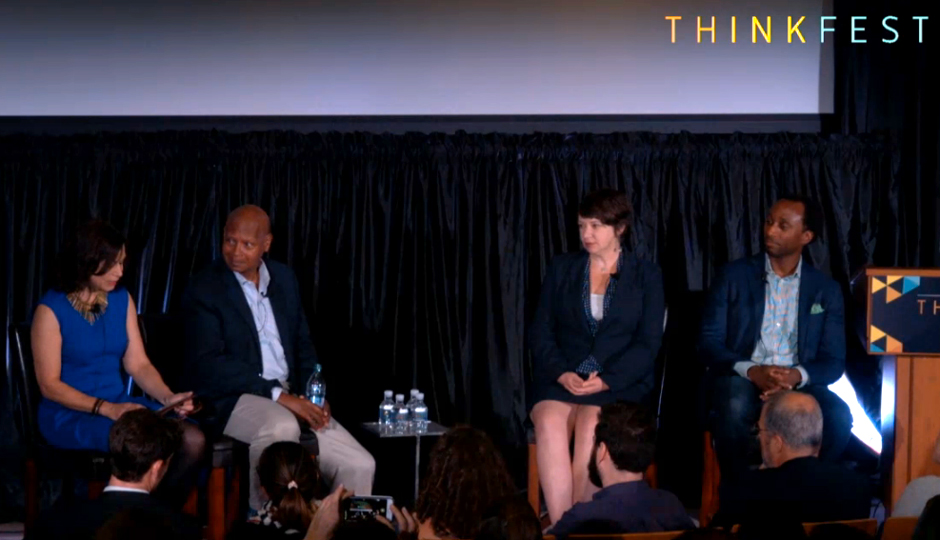ThinkFest Recap: The Gentrification Train “Has Not Left Station” — Yet

From left: Inga Saffron, Jay McCalla, Beth McConnell and Calvin Gladney on “The Gentrification Wars: Can Philly Have Urbanism and Equality” at ThinkFest.
ThinkFest is streaming live all day. Watch ThinkFest here.
Pulitzer Prize-winning architecture critic Inga Saffron has written about the city’s changing skyline for 16 years. Today, she says, “you cannot write about the changing city of Philadelphia, without writing about gentrification.”
Saffron Friday moderated a ThinkFest panel centered on a question that is being asked with greater and greater urgency as Philadelphia’s redevelopment accelerates: “Can Philly have urbanism and equity?”
Joining Saffron were Jay McCalla, a former city official and Citified columnist; Beth McConnell, policy director of the Philadelphia Association of Community Development Corporations; and Calvin Gladney, managing partner at Mosaic Urban Partners.
They disagreed on plenty, but there seemed to be consensus that it was still possible for Philadelphia to have urbanist amenities and equitable neighborhoods.
Near the end of the discussion, McConnell said: “the train has not left the station yet in Philadelphia.” She cited the gentrification battleground of Point Breeze, and said there was still enough vacant property and tax delinquent parcels in the neighborhood to build a solid supply of affordable housing. The city has a chance, she said, to “create mixed income neighborhoods of opportunity — and I really hope the next mayor makes that a priority.”
Other highlights from the panel included…
McCalla on the unaffordable cost of affordable housing: McCalla said that every affordable housing unit costs taxpayers between $80,000-$100,000. That cost is too high to meet the enormous affordable housing demand. “We’ll build 200 or 300 units, while there are 100,000 families on the waiting list at the [Philadelphia Housing Authority].”
McConnell on making better use of the city’s existing housing stock: “We have to figure out a way to repair those homes.” She suggested a program where market-rate developers would invest in rehabilitating nearby homes, “where the roof is caving in.” That, she said, would in turn raise the value of the developers’ new construction in the community.
Gladney on the importance of prepping small business owners for gentrification: He cited the Washington D.C. example of Ben’s Chili Bowl, an iconic eatery that survived gentrifying forces that drove out many other old U Street businesses. “They bought their own building … They added turkey dogs and turkey burgers … When the forces of gentrification happened, they were ready.”